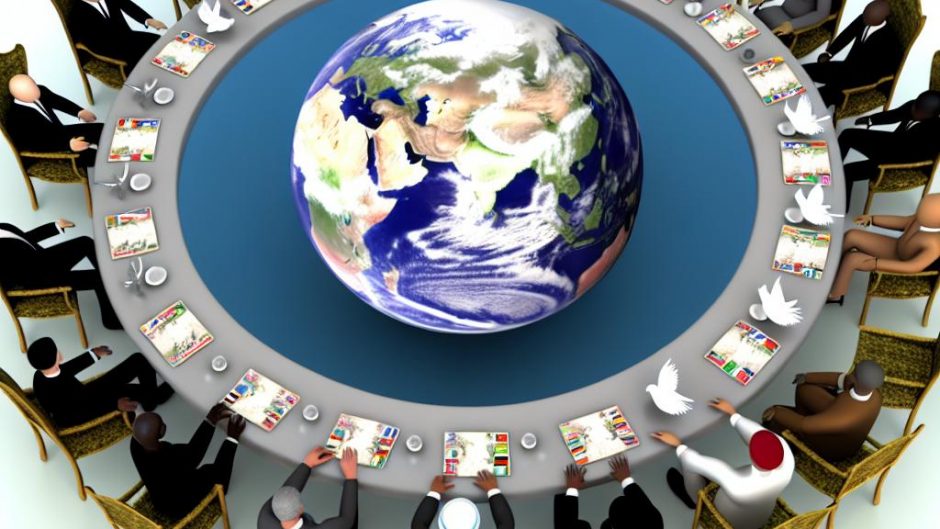The Role of Diplomacy in Global Power Dynamics
Diplomacy plays an essential role in international relations, which is particularly evident in scenarios where nations strive for supremacy on the global stage or engage in what might be termed “world domination mode.” This concept refers to the strategic pursuit of global influence and authority by nations through a based approach on political, economic, and military means.
Building Alliances
Diplomacy is foundational in forming alliances, a critical aspect of shaping international relations. Through conscientious diplomatic engagement, nations establish robust ties, fostering mutually beneficial relationships that enhance their standing globally. These alliances manifest in various forms, such as trade agreements, defense pacts, and collaborations in scientific research, all of which significantly extend a nation’s influence globally and bolster its international reputation without the need for military confrontation.
An alliance between nations often acts as a strategic tool to balance power dynamics, wherein smaller or medium-sized countries can increase their influence by aligning with more powerful states, thereby fostering greater international stability. In the current geopolitical landscape, strategic alliances have evolved beyond traditional parameters, incorporating digital realms like cybersecurity collaborations, which further broaden their scope and importance.
Conflict Resolution
One of the most significant roles of diplomacy lies in its capacity for conflict resolution. Through diplomatic negotiations, potential conflicts can be addressed and diffused before escalating into full-blown wars. Effective dialogue and negotiation foster diplomatic channels, allowing for peaceful resolutions that might necessitate compromises or innovative alternative solutions. This diplomatic process reduces the likelihood of aggressive posturing between nations, preserving stability and minimizing the expansive allocation of resources often required during military engagements.
Moreover, diplomatic interventions in conflict resolution extend to participating in international forums and debates where long-standing disputes can be addressed systematically. The efficacy of diplomacy is abundantly visible in historical contexts where agreements and ceasefires have been brokered, ensuring that peace prevails over rift.
Economic Strategy
The economic strategy is another pivotal element in achieving and maintaining global dominance. Diplomatic relations are instrumental in opening new markets and facilitating trade, considerably strengthening and diversifying national economies. The establishment of trade agreements not only improves a nation’s balance of trade but also attracts foreign investments which substantially boost a country’s economic status. Diplomacy serves as a bridge to economic prosperity, contributing indirectly to a nation’s overall ascendancy in the global power structure.
In the realm of economic diplomacy, multi-lateral trade agreements can help countries eliminate barriers to trade, thus creating more opportunities for economic cooperation. As international businesses seek reliable partners, the diplomatic ties between countries can lead to joint ventures and investments that further integrate global economies. These cooperative efforts not only have economic benefits but also strengthen diplomatic relationships over long periods.
Cultural Diplomacy
Cultural diplomacy is a facet of diplomacy that allows a country to exert its influence—often referred to as soft power—across the globe without the use of military force. Through the promotion of culture, values, and policy by way of diplomatic channels, a nation can intentionally shape international perspectives and norms. This cultural diplomacy is achieved through various initiatives, including cultural exchanges, educational programs, and international broadcasting, all designed to promote a nation’s image and presence positively on the international stage.
By effectively utilizing cultural diplomacy, nations can improve how they are perceived globally, leading to stronger diplomatic relations. By encouraging the understanding and appreciation of cultures between nations, cultural diplomacy fosters a sense of global community and unity, promoting partnership and collaboration across different spheres of influence.
While cultural diplomacy often operates subtly, its reach can be profound, leaving lasting impressions on international audiences. Nations often host cultural festivals, support traveling exhibitions, and engage in arts exchanges to foster understanding and build long-term relationships.
The Balance of Power through Diplomatic Engagement
Diplomacy’s overarching goal in the global context is often to achieve a delicate balance of power. Through strategic engagement, diplomacy serves multiple functions—mitigating conflicts, promoting economic growth, and enhancing cultural understanding—thus allowing nations to maintain stable and cooperative relations with other countries. In essence, diplomacy acts as the catalyst for ensuring a balanced distribution of power, which ultimately contributes to global stability and peace.
Diplomatic measures often involve engagement at different levels, from bilateral talks between two countries to multilateral negotiations involving several nations or international organizations such as the United Nations. The platform of diplomacy allows for the discussion and resolution of global issues, including climate change, security threats, and public health crises.
Following a strategic diplomatic approach, nations prioritize dialogue and cooperation, ensuring that their foreign policies are not solely reactionary but proactive. This strategy allows for the anticipation of potential disputes and addressing scenarios before they exacerbate.
Conclusion: Diplomacy as a Cornerstone of Global Interaction
In conclusion, diplomacy remains a cornerstone of international interaction, encompassing various dimensions from alliance-building, conflict resolution, economic strategy, to cultural exchange. Each of these facets collaborates towards a singular goal: enhancing a nation’s power and influence in a peaceful and equitable manner. Through these diplomatic activities, nations can project power, influence global norms, and promote stability and progression within the international community.
To gain further insights into the mechanisms and effects of diplomacy in the international realm, interested individuals might refer to comprehensive studies and analytical documents from reputable institutions such as the United Nations Development Programme or Chatham House. Through a thorough understanding of diplomacy’s intricacies, one can appreciate more fully the broad, understated yet impactful role it plays in global affairs.
This article was last updated on: September 20, 2025






Recent Comments